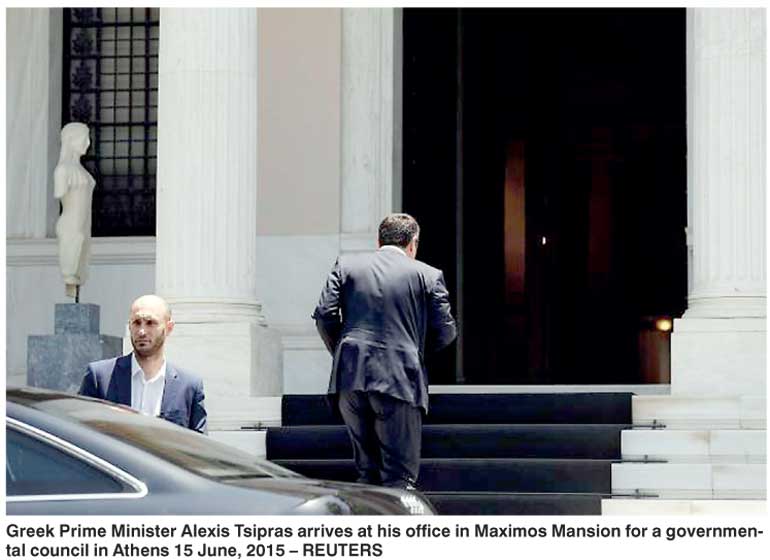Saturday Feb 21, 2026
Saturday Feb 21, 2026
Tuesday, 16 June 2015 00:03 - - {{hitsCtrl.values.hits}}
Reuters: Germany’s EU commissioner said on Monday it was time to prepare for a “state of emergency” after talks collapsed at the weekend to rescue Greece from default and ejection from the euro.
Prime Minister Alexis Tsipras ignored a litany of pleas from European leaders to act fast and instead blamed creditors for the collapse in aid-for-austerity talks, the biggest setback yet in long-running talks to secure more aid for Greece.
Athens now has just two weeks to find a way out of the impasse before it faces a 1.6 billion euro bill due to the International Monetary Fund, potentially leaving it out of cash, unable to borrow and cast out of the single currency.
While there was little sign of open panic in Athens as Greeks held out hope for a last-minute solution - a familiar theme over the past six years as Athens lurched from one crisis to the next - the latest impasse triggered a selloff in European and Asian shares and weighed on the euro.

Greek stocks fell 6 percent, while banking stocks tumbled as much as 12%. Greek two-year government bond yields surged more than three percentage points to 29.02%.
“We should work out an emergency plan because Greece would fall into a state of emergency,” Germany’s EU commissioner Guenther Oettinger said. “Energy supplies, pay for police officials, medical supplies, and pharmaceutical products and much more” needed to be ensured.
But in Athens, Tsipras – the 40-year-old novice radical leftist leader elected on a pledge to end austerity - betrayed few signs of alarm.
Ignoring warnings from European policymakers that it was up to Athens to act now, Tsipras coolly said he was happy to wait it out till the lenders changed their minds.
“We will await patiently until the institutions accede to realism,” Tsipras said in a statement to Greek newspaper Efimerida ton Syntakton. “We do not have the right to bury European democracy at the place where it was born.”
He blamed “political expediency” on the part of lenders and their insistence on new cuts in pensions “after five years of looting under the bailouts” for the latest impasse.
Limits for all sides
Tsipras will meet his negotiating team later on Monday as his government plots its next move before a make-or-break meeting of euro zone finance ministers on Thursday to discuss Greece’s fate and make a final attempt to bridge differences.
Athens has balked at demands to raise taxes and cut pensions to narrow a projected budget gap and laid the blame squarely on European and IMF creditors for insisting on politically unpalatable pension cuts.
It says years of cuts have only made its situation worse by shrinking the economy, making it harder to pay off debt.
Greece’s creditors argue the country must reform its pensions system if it is to put government finances on a sustainable footing. They say many Greek workers retire younger than in other European countries, collecting pensions that require unaffordable government subsidies.
“Why insist on pensions? Pensions and wages account for about 75% of primary spending; the other 25 percent have already been cut to the bone,” IMF chief economist Olivier Blanchard wrote in a blog post.
“Just as there is a limit to what Greece can do, there is a limit to how much financing and debt relief official creditors are willing and realistically able to provide given that they have their own taxpayers to consider.”
The prospect of snap elections or a referendum to allow Tsipras a face-saving way out of the crisis returned as an option in popular debate in Greece, as the leftist leader faced calls from the opposition to secure a deal to protect the country from an economic collapse.
Although many economists predict that, as in past crises, a way will be found to avert default, European politicians sound more determined than ever to resist compromising with demands they consider unreasonable.
Belgian Finance Minister Johan Van Overtveldt said in Berlin that the euro zone’s credibility would be damaged if agreements with Greece were changed, and radical forces in other countries would be emboldened.
Jens Weidmann, the head of Germany’s central bank, said: “Time is running out for Greece. The willingness to do a deal and act is lacking.”
Greece’s Finance Minister Yanis Varoufakis retorted in an interview with Germany’s Bild newspaper that it was possible to reach a deal quickly if Chancellor Angela Merkel took part in the talks.
“I rule out a ‘Grexit’ as a sensible solution,” Varoufakis said, referring to a possible Greek exit from the euro zone. “But no one can rule out everything. I can’t even rule out a comet hitting Earth.”